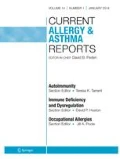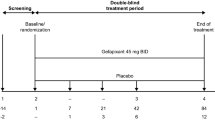Abstract
NSAIDs—including aspirin (ASA)—that inhibit cyclooxygenase (COX)-1 induce nonallergic hypersensitivity reactions consisting of attacks of rhinitis and asthma. Such reactions occur exclusively in a subset of asthmatic patients who also have underlying nasal polyps and chronic hyperplastic eosinophilic sinusitis. We now refer to their underlying inflammatory disease of the entire respiratory tract as aspirin-exacerbated respiratory disease. This review focuses on descriptions of these patients; methods available to diagnose ASA-exacerbated respiratory disease; the unique ability of all NSAIDs that inhibit COX-1 to cross-react with ASA; lack of cross-reactivity with selective COX-2 inhibitors; an update on pathogenesis; and current thoughts about treatment, including ASA desensitization and daily ingestion of ASA itself.
Similar content being viewed by others
References and Recommended Reading
Widal MF, Abrami P, Lermeyez J: Idiosyncratic anaphylaxis [in French]. Presse Med 1922, 30:189–192.
Samter M, Beers R Jr: Intolerance to aspirin: clinical studies and consideration of its pathogenesis. Ann Intern Med 1968, 68:975–983.
Stevenson D, Simon RR, Zuraw BL: Sensitivity to aspirin and NSAIDs. In Middleton’s Allergy Principles and Practice, edn 6. Edited by Adkinson NJ, Yunginger JW, Busse WW, et al. Philadelphia: CV Mosby and Co.; 2003:1695–1710.
Johannessen S, Bieber T, Dahl R, et al.: Revised nomenclature for allergy for global use: Report of the Nomenclature Review Committee of the World Allergy Organization, October 2003. J Allergy Clin Immunol 2004, 113:832–836.
Stevenson D, Szczeklik A: Current and pathologic perspectives on aspirin sensitivity and asthma. J Allergy Clin Immunol 2006, 118:773–786.
Berges-Gimeno M, Simon RA, Stevenson DD: The natural history and clinical characteristics of aspirin exacerbated respiratory disease. Ann Allergy Asthma Immunol 2002, 89:474–478.
Szczeklik A, Nizankowska E, Duplaga M: Natural history of aspirin-induced asthma. AIANE Investigators. European Network on Aspirin-Induced Asthma. Eur Respir J 2000, 16:432–436.
Jenkins C, Costello J, Hodge L: Systematic review of prevalence of aspirin-induced asthma and its implications for clinical practice. BMJ 2004, 328:434–437.
Delaney JC: The diagnosis of aspirin idiosyncrasy by analgesic challenge. Clin Allergy 1976, 6:177–181.
Dursun AB, Woessner KA, Simon RA, et al.: Predicting outcomes of oral aspirin challenges in patients with asthma, nasal polyps and chronic sinusitis. Ann Allergy Asthma Immunol 2008, 100:420–425.
Weber RW, Hoffman M, Raine DA, Nelson HS: Incidence of bronchoconstriction due to aspirin, azo dyes, non-azo dyes, and preservatives in a population of perennial asthmatics. J Allergy Clin Immunol 1979, 64:32–37.
Szczeklik A, Gryglewski RJ, Czerniawska-Mysik G: Clinical patterns of hypersensitivity to nonsteroidal anti-inflammatory drugs and their pathogenesis. J Allergy Clin Immunol 1977, 60:276–284.
Settipane RA, Stevenson DD: Cross sensitivity with acetaminophen in aspirin sensitive asthmatics. J Allergy Clin Immunol 1989, 84:26–33.
Stevenson DD, Hougham A, Schrank P, et al.: Disalcid cross-sensitivity in aspirin sensitive asthmatics. J Allergy Clin Immunol 1990, 86:749–758.
Bavbek S, Celik G, Ediger D, et al.: The use of nimesulide in patients with acetylsalicylic acid and nonsteroidal anti-inflammatory drug intolerance. J Asthma 1999, 36:657–663.
Vaghi A: Tolerance of meloxicam in aspirin-sensitive asthmatics. Am J Respir Crit Care Med 1998, 157:715.
Gyllfors P, Bochenek G, Overholt J, et al.: Biochemical and clinical evidence that aspirin-intolerant asthmatic subjects tolerate the cyclooxygenase 2-selective analgetic drug celecoxib. J Allergy Clin Immunol 2003, 111:1116–1121.
Stevenson D, Simon RA: Lack of cross-reactivity between rofecoxib and aspirin in aspirin sensitive asthmatic patients. J Allergy Clin Immunol 2001, 108:47–51.
Szczeklik A, Nizankowska E, Bochenek G, et al.: Safety of a specific COX-2 inhibitor in aspirin-induced asthma. Clin Exp Allergy 2001, 31:219–225.
Woessner K, Simon RA, Stevenson DD: The safety of celecoxib in aspirin exacerbated respiratory disease. Arthritis Rheum 2002, 46:2201–2206.
Levy MB, Fink JN: Anaphylaxis to celecoxib. Ann Allergy Asthma Immunol 2001, 87:72–73.
Baldassarre S, Schandene L, Choufani G, Michils A: Asthma attacks induced by low doses of celecoxib, aspirin and acetaminophen. J Allergy Clin Immunol 2006, 117:215–217.
Stevenson DD: Anaphylactic and anaphylactoid reactions to aspirin and nonsteroidal anti-inflammatory drugs. Immunol Allergy Clin North Am 2001, 21:745–768.
Stevenson DD: Oral challenges to detect aspirin and sulfite sensitivity in asthma. N Engl Reg Allergy Proc 1988, 9:135–142.
Nizankowska E, Bestynska-Krypel A, Cmiel A, Szczeklik A: Oral and bronchial provocation tests with aspirin for diagnosis of aspirin-induced asthma. Eur Respir J 2000, 15:863–869.
Micheletto C, Tognella S, Visconti M, et al.: Changes in urinary LTE4 and nasal function following nasal provocation tests with ASA-tolerant and intolerant asthmatics. Respir Med 2006, 100:2144–2150.
Milewski M, Mastalerz L, Nizankowska E, Szczeklik A: Nasal provocation test with lysine-aspirin for diagnosis of aspirinsensitive asthma. J Allergy Clin Immunol 1998, 101:581–586.
Berges-Gimeno MP, Simon RA, Stevenson DD: The effect of leukotriene modifier drugs on ASA-induced asthma and rhinitis reactions. Clin Exp Allergy 2002, 32:1491–1496.
White A, Ludington E, Mehra P, et al.: Effect of leukotriene modifier drugs on the safety of OACs. Ann Allergy Asthma Immunol 2006, 97:688–693.
White A, Bigby TA, Stevenson DD: Intranasal ketorolac challenge for the diagnosis of aspirin exacerbated respiratory disease. Ann Allergy Asthma Immunol 2006, 97:190–195.
Williams A, Simon RA, Woessner KM, Stevenson DD: The relationship between historical aspirin-induced asthma and the severity of asthma induced during oral aspirin challenges. J Allergy Clin Immunol 2007, 120:273–277.
Szczeklik A: Aspirin-induced asthma as a viral disease. Clin Allergy 1988, 18:15–20.
Davoine F, Cao M, Wu Y, et al.: Virus-induced eosinophil mediator release requires antigen-presenting and CD4+ T cells. J Allergy Clin Immunol 2008, 122:69–77.
Daffern P, Muilenburg D, Hugli TE, et al.: Association of urinary leukotriene E4 excretion during aspirin challenges with severity of respiratory responses. J Allergy Clin Immunol 1999, 104:559–564.
Szczeklik A, Sladek K, Dworski R, et al.: Bronchial aspirin challenge causes specific eicosanoid response in aspirinsensitive asthmatics. Am J Respir Crit Care Med 1996, 154:1608–1614.
Sanak M, Szczeklik A: Leukotriene C4 synthase polymorphism and aspirin-induced asthma. J Allergy Clin Immunol 2001, 107:561–562.
Sousa A, Parikh A, Scadding G, et al.: Leukotriene-receptor expression on nasal mucosal inflammatory cells in aspirin-sensitive rhinosinusitis. N Engl J Med 2002, 347:1524–1526.
Bochenek G, Nagraba K, Nizankowska E, Szczeklik A: A controlled study of 9alpha11beta-PGF2 (a PGD2 metabolite) in plasma and urine of patients with bronchial asthma and healthy controls after aspirin challenges. J Allergy Clin Immunol 2003, 111:743–749.
Powell W: A novel PGD2 receptor expressed in eosinophils. Prostaglandins Leukot Essent Fatty Acids 2003, 69:179–185.
Szczeklik A, Sanak M: The broken balance in aspirin hypersensitivity. Eur J Pharmacol 2006, 533:145–155.
Kowalski ML, Sliwinska-Kowalska M, Igarashi Y, et al.: Nasal secretions in response to acetylsalicylic acid. J Allergy Clin Immunol 1993, 91:580–598.
Szczeklik A: Prostaglandin E2 and aspirin-induced asthma [letter, comment]. Lancet 1995, 345:1056.
Sestini P, Armetti L, Gambaro G, et al.: Inhaled PGE2 prevents aspirin-induced bronchoconstriction and urinary LTE4 excretion in aspirin-sensitive asthma. Am J Respir Crit Care Med 1996, 153:572–575.
Dahlen B, Nizankowska E, Szczeklik A, et al.: The benefits of adding the 5-lipoxygenase inhibitor zileuton to conventional therapy in aspirin-intolerant asthmatics. Am J Resp Crit Care Med 1998, 157:1187–1194.
Dahlen S, Malstrom K, Nizankowska E, et al.: Improvement of aspirin-intolerant asthma by montelukast, a leukotriene antagonist. A randomized, double-blind, placebo-controlled trial. Am J Respir Crit Care Med 2002, 165:9–14.
Amar YG, Frenkiel S, Sobol SE: Outcome analysis of endoscopic sinus surgery for chronic sinusitis in patients having Samter’s triad. J Otolaryngol 2000, 29:7–12.
Sweet JA, Stevenson DD, Simon RA, Mathison DA: Long term effects of aspirin desensitization treatment for aspirin sensitive rhinosinusitis asthma. J Allergy Clin Immunol 1990, 86:59–65.
Berges-Gimeno M, Simon RA, Stevenson DD: Treatment with aspirin desensitization in patients with aspirin exacerbated respiratory disease. J Allergy Clin Immunol 2003, 111:180–186.
Stevenson DD, Hankammer MA, Mathison DA, et al.: Long term ASA desensitization-treatment of aspirin sensitive asthmatic patients: clinical outcome studies. J Allergy Clin Immunol 1996, 98:751–758.
Stevenson D, Simon RA: Selection of patients for aspirin desensitization. J Allergy Clin Immunol 2006, 116:801–804.
Author information
Authors and Affiliations
Corresponding author
Rights and permissions
About this article
Cite this article
Stevenson, D.D. Aspirin sensitivity and desensitization for asthma and sinusitis. Curr Allergy Asthma Rep 9, 155–163 (2009). https://doi.org/10.1007/s11882-009-0023-4
Published:
Issue Date:
DOI: https://doi.org/10.1007/s11882-009-0023-4



